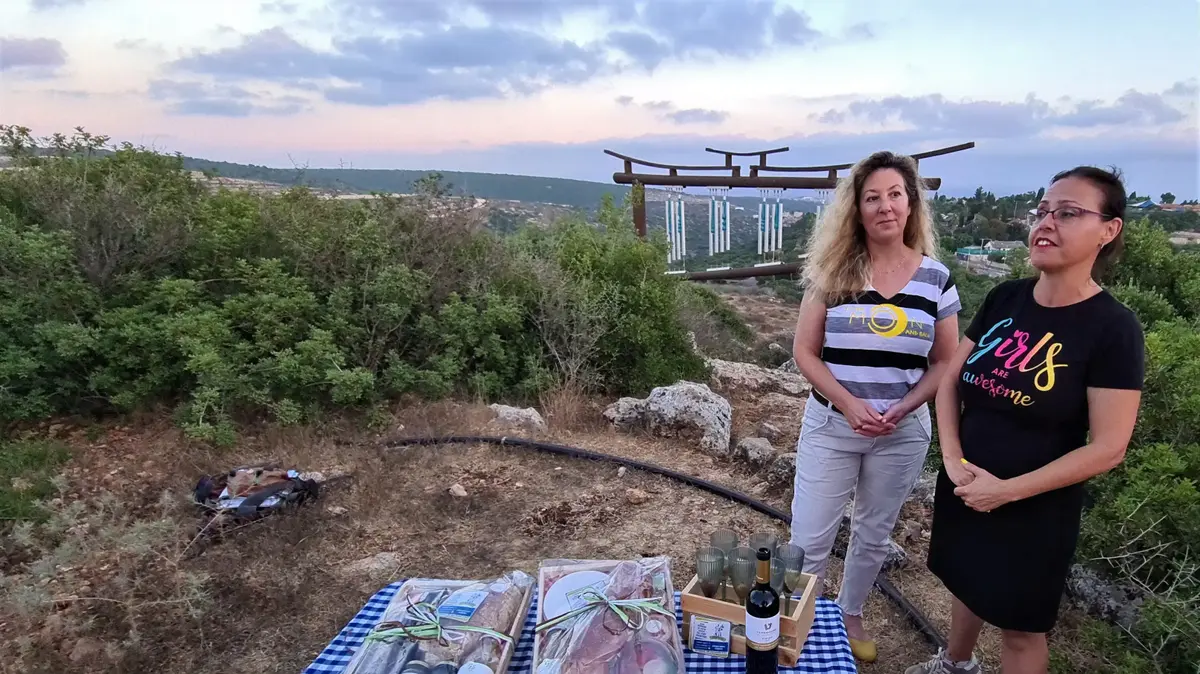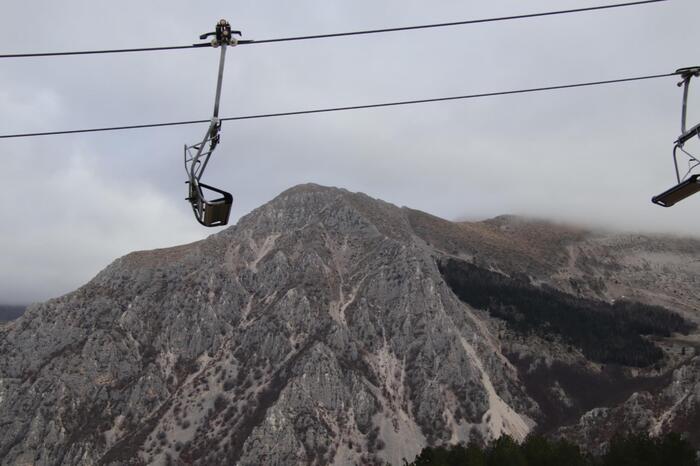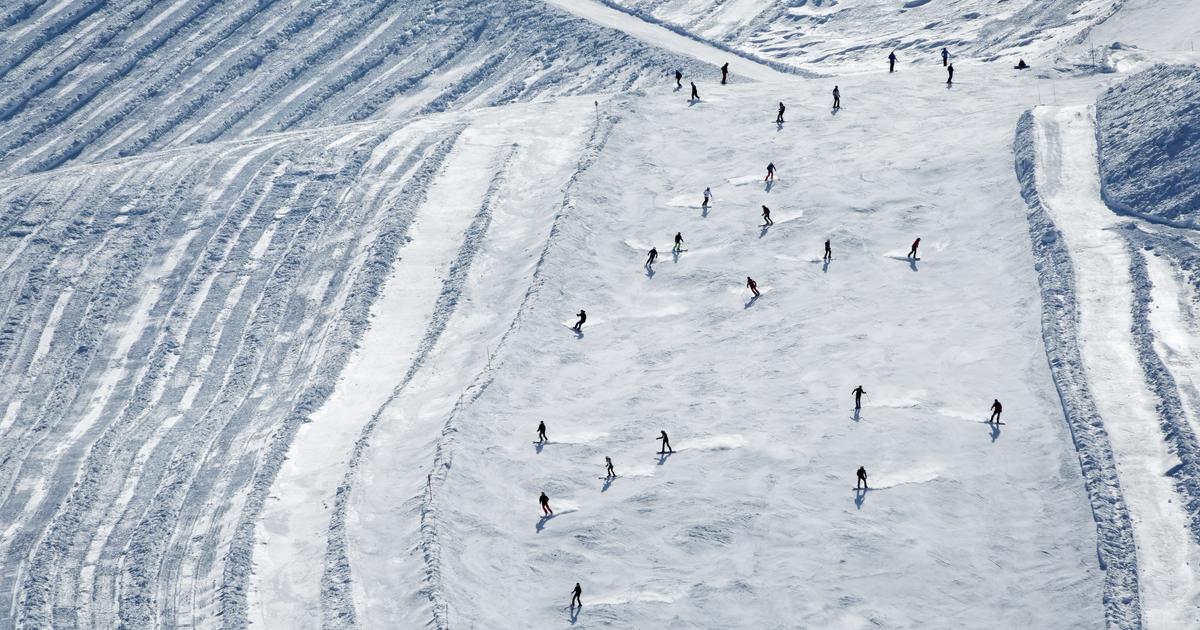You won't find a hotel or luxurious B&Bs, it is not saturated with springs or refreshing water sources, nor cool restaurants that come especially for them.
On the face of it, you might not find too many reasons (although there are plenty) to come to the area of the Menashe Regional Council, the one that is on the border of Hadera to the west, Umm Al Fachem to the northeast and the Green Line to the south.
But then you get to the village of Katir, and everything changes.
A fascinating trip to the village of Katzir (Photo: Ziv Reinstein)
More in Walla!
The fascinating Druze village you haven't been to
By merit and not by grace: there are many good reasons to visit Kfar Hassidim
In Paki'in they invite: "Instead of flying to Greece - you have Greece in Israel"
Hospitalization in your home instead of a hospital: this is how it is done right
"Harvest but not reaped"
"It is a large concentration of surprises on one mountain," says Guy Mellal, a tourism consultant who knows this communal settlement well.
"Katsir is part of the "Observatories in the Galilee" program, and this is the southernmost observatory even though it is in Samaria," explains Tal Raz, a local guide and perhaps one of the tourism leaders in the region.
Indeed, when you arrive at Katzira, you realize that the settlement was built on two hills (and soon a third) in the Amir Ridge that rise to a height of about 350 meters above sea level on average, which gives it a great air and an amazing view like in the Galilee, even though you are almost in the center.
The name of the settlement does join the name of settlements with agricultural names in the area, such as Manit, Magal and even the city of Harish, but you will not find many farmers among its 3,200 residents, or as Tal says: "Harvest but not reaping", because everyone goes out to work.
Part of the livelihood in the settlement revolves around artisans and crafts.
More in Walla!
The village that brands itself as "Savion in the Galilee"
To the full article
Part of the "Watchers in the Galilee" program, even though it is in Samaria.
Harvest (Photo: Ziv Reinstein)
The sunsets from there are simply breathtaking.
An ecological bench of Bnei Mitzvah at harvest time (Photo: Ziv Reinstein)
The wisdom of the circle
Tali Gaon, for example, is an occupational therapist who discovered that mandalas tell everything that is important to her.
She has been living in harvest with her husband for 25 years, an ecological life as much as possible and her children even attended the "Gesher al Havadi" mixed school at her school, which marks 18 years since it was founded.
Unlike other mixed (Jewish-Arab) schools, this school is located in an Arab settlement - Kfar Kara.
"It gives a lot of pluses," she says, and thus in the language of the mandalas "beating heart" was created and she began to create green, ecological art from everything she finds or brings to her - corks, buttons, jars and more.
According to her, "When you see a mandala - it shows you that you are part of wholeness, of a great human tissue and only if others are well - you will be well too. The mandala reminds us that we are part of the wisdom of the circle where everyone should be well."
At the meeting she holds at her home, she talks about her lifestyle and conducts workshops for creating mandalas lasting one and a half to five hours.
Price for the workshop: NIS 30-50 per person, NIS 900 per group.
"When you see a mandala - it shows you that you are part of a whole."
Tali Gaon's house (Photo: Ziv Reinstein)
We are part of a large human tissue.
Tali Gaon and Mandala Shisara (Photo: Ziv Reinstein)
The artisans' quarry
In contrast to the old Tali in the settlement, many artisans have started to harvest in recent years, many of them from the Hana-Karkur orchard, and found in it the crucible of their quarry (literally).
Thus, Kiryat HaOmen was established - a small and charming street full of old caravans of the settlement's founders, which were turned into craft workshops, and it is very fun to walk around them.
For example, the studio of the sculptor Binyamin Vital, who lived for seven years in Katzer and came to him from Pardes Hana, after there was an earthquake and he was looking for another place to live.
"My work is in a drawer, I work between myself and myself," he says when he shows his creation "70 Faces".
"My inspiration comes from pain," he said.
"I put a question mark and then poke around and then come to work."
Among his works you can see a white dove of peace with a pomegranate, or African sculptures, face sculptures and other special works.
Kiryat Omen, Caravan 2, 052-4405181.
"Inspiration comes from pain."
Sculptures at Studio Vital in Katzer (Photo: Ziv Reinstein)
"Puts a question mark and then pokes around and gets to work."
The sculptor Benjamin Vital (photo: Ziv Reinstein)
work in the forest
Further along the artists' path, we will find a cool and quite new project called "Forest", which is a kind of local we work, where you can work or listen to lectures.
The venture was founded by Sarah, an entrepreneur from the high-tech field, who about two years ago wanted to stop the technological race of life and "try to establish something with more connection to nature", as she says.
In the compound she established, which is built of wood, there are individual and group workstations, including a computer, office services, a meeting room, several sofas in the large hall suitable for intimate lectures, a kitchen equipped with an espresso machine and even the "happy-hour" of wine and beer on Thursdays.
Free networking sessions are held on Fridays.
"I felt like I was in a forest thanks to the trees around and I also always wanted to say that I work in a 'forest'" says Sarah.
A personal workstation will cost NIS 89 per person per day, at a shared table - NIS 69.
But half a day is also possible.
To coordinate: 052-5558879.
A kind of local we work.
The "Forest" work complex (Photo: Ziv Reinstein)
Individual and group workstations in the complex (photo: Ziv Reinstein)
Also a cafe, also a 2nd hand store
Still in Kiryat Omen, a visit to a lovely place founded by Michal Adam called "Mick's Place".
Adam, an architect by profession, opened a cafe and second hand store in one place.
"The items in the store are mine but a lot of people bring their own items, for example artists who bring their works and we share the profits if someone buys. My friends also bring things," she says.
Mick's Place opened in May 2020, during the Corona period, and Adam explains that people came to hang out at the cafe because they didn't want to hang out.
"I had to entertain the locals and I did everything: served, baked, sold - everything," he adds.
In the cafe you will find hot and cold drinks, beers, smoothies, cheeses, cakes, bread and dips and more.
Open every day (except Saturday) from 09:00 to 21:00 and on Friday until 14:00.
Kiryat HaOmen Pavilion 8.
2nd hand cafe and shop. Mick's Place (Photo: Ziv Reinstein)
An architect who was looking for something to do in Corona.
Michal Adam (Photo: Ziv Reinstein)
The man who spreads his wings and flies
Right in front of the cafe is a studio that you must enter, because the art in it is simply stunning and especially the person who makes it - the sculptor Zvika Altman.
11 years ago he came to harvest and opened a sculpture studio where he teaches adults and children to sculpt in a variety of techniques and mainly produces series of sculptures.
Altman's bird series, for example, was created "to remove the barriers of man", according to him.
"I'm not waiting for retirement to fulfill my dreams," he says, "but I'm spreading my wings and flying."
In his studio you will see the basalt sculpture "Even with one stone wing you can fly", or a family sculpture of birds that lift each other up.
Another sculpture is "Another Truth", in which he took the symbol of the aerospace industry where his father worked, and replaced the plane with a bird and added a compass.
Among other things, Altman volunteers and teaches children in boarding schools, and this "to pass on the knowledge, as I received, so that the knowledge does not die", and together they make an artistic mark throughout the country.
"
To visit: 052-3345490.
For the group, the visit is paid.
The series of birds in the studio of the sculptor Zvika Altman (photo: Ziv Reinstein)
"Don't wait for retirement to make dreams come true."
Zvika Altman (Photo: Ziv Reinstein)
Learn to make pizza from YouTube
To rest a little from the art, take a break at the pizza artist - Golan - who about three years ago opened "Papa Angelo".
Before becoming the pizza man, Golan worked as a renovation contractor, but at the age of 40, he decided that it was hard for him and wanted a change, and the change did come.
"I learned how to make pizza from YouTube and built a Tabun house," he explains how he started baking.
Among the pizzas he prepares are napolitana in a family version, or pizza bianca with mascarpone and picorino cream sauce, nutmeg, basil, sweet potato and walnuts.
A family platter will cost NIS 68 before toppings.
Open: 23:00-13:00 except Friday.
Saturday from 23:00-17:00, and of course there are deliveries.
04-6831757.
He got tired of the renovations, so he learned to make pizza.
Golan in "Papa Angelo" (Photo: Ziv Reinstein)
Locals eat Golan's pizza in Kiryat HaOmen (Photo: Ziv Reinstein)
Yasso Vertis!
You can take a short break from work at the local pub "Vertis" (named after the Greek singer Nikos Vertis) which is open on Thursdays and Saturdays from 21:00.
In the pub that Lior Dahan built with his ten fingers, he tries to bring artists for small performances, such as Hami Rodner who performed and others.
"Everything started to provide a cultural response to the residents," says Dahan, who also holds weddings, bar mitzvahs and other events with catering from the area.
"I try to leave the livelihood with the locals," he adds and dreams of a performance by Avitar Banai or his uncle Tessa at "Vertis" (for the information of surfers Banai and Tessa).
"Everything started to provide a cultural response to the residents."
Pub "Vertis" (Photo: Ziv Reinstein)
Dreaming of a performance by Avitar Banai or Dodo Tesa in his pub.
Lior Dahan (Photo: Ziv Reinstein)
In a ditch in the middle of fields
At sunset, to give way to the "claw of the bird".
In the harvest, the residents built several easy hiking trails called mashools, such as Mas'ul al-Ahvat (which leads, perhaps, to the city of Sisra, the "Factory of the Gentiles"), or Mas'ul Tsippur, established by Orli Nadir and volunteers from the settlement "to connect the residents to nature," Tal Raz explains.
A large and impressive wind chime was erected by Noam Zamir in the Tsiptur village.
To also walk a distance of two minutes to another impressive point - Mitzpe Dor - named after a son of the village Dor Elkayam who was killed in a car accident in Be'er Sheva in 2018.
Perfect for observation and picnic.
A wind chime in the bird's nest (Photo: Ziv Reinstein)
Established in memory of the local man who passed away in 2018.
Mitzpe Dor (Photo: Ziv Reinstein)
Who wants a "happy box"?
The view from these two places is simply heart-expanding, and it is also a great place for a quality picnic provided by the "pioneers" - Tali Argov and Efrat Zimet - who during the Corona period began producing food packages for private residents and very soon for companies as well.
"It grew so fast and it was not possible to make deliveries to everyone, until we started packaging products that are produced for us," they say.
For example, in their picnic baskets you will find high-quality bread, natural juice, quiche, salad, six spreads and wine from Teperberg Winery, biodegradable dishes and even a locally made wooden tray.
Now they operate deliveries to homes, offices and also to the private traveler who can pick up a romantic or family platter.
"And there is also a 'happy box'" they say, where you can attach and send a gift.
Beyond that, the two also went from other groups to brunches in the Jezreel Valley.
Double cedar price: NIS 185 without shipping.
054-2289892.
The "Pioneers" (Efrat and Tali) will be happy to make you happy with their picnic box (Photo: Ziv Reinstein)
"A tree that had a previous life"
Evening fell on harvest, so Tal Raz invited me to her house, which is an attraction in itself.
Her wooden house and that of her partner, Noam Zamir, a carpenter who uses "a tree that had a previous life", says Raz, "because it has all the life that the tree absorbed in the king of the road and also to not cut down new trees".
For example, the door is made of a wine barrel, and over time the house became a kind of family gallery where there are many works of art, even by the couple's mothers who display their works there, as well as Tal and Noam's daughter, Shahar, who paints.
You can come for a lovely tour of the house, hear explanations about the place and of course about Katzir (Vetal knows Katzir and the area best, believe me), or to a jewelry workshop in burning silver and copper in combination with small stones.
Visit: NIS 40 per person, workshop for groups NIS 1,500-650, and family - NIS 250.
050-3841513.
The place became a family gallery.
The house of Tal and Noam (Photo: Ziv Reinstein)
The person who knows Katzir best, including the area.
Tal Raz (Photo: Ziv Reinstein)
tourism
Trips in the country
Trips in the north
Tags
harvesting
Ramot Menashe
Trips in the country














